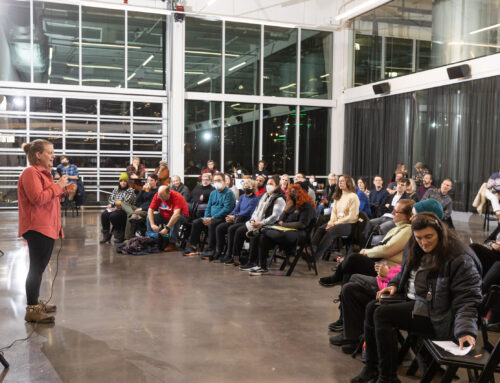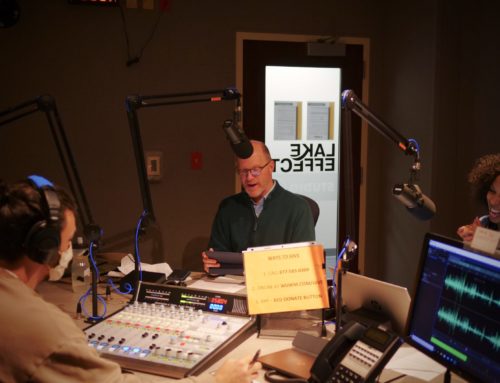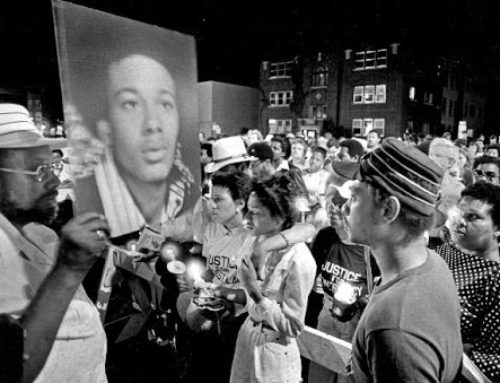by Ex Fabula Blogger, Steph Kilen
Turns out “Ex Fabula” is latin for “from stories,” but Milwaukeese for “you better get there early ‘cause the place is gonna be packed.” Folks from across the city and across generations packed Kochanski’s Concertina Beer Hall Saturday, Jan. 28, for the latest installment of Terminal Milwaukee. The event celebrated neighborhoods of Layton Boulevard West (Layton Park, Burnham Park, and Silver City) where Kochanski’s is located, and the theme “Generation Gap.”
After Vern and the Originals snuck in one last German drinking song, the crowd joyfully joining in, Milwaukee historian John Gurda started out the night with some history of the neighborhood. We learned that Layton Park was named for the Layton family who immigrated to the area from England in the 1840s. Originally settled by German and Polish immigrants, the area has been home to celery farms, the malt belt, a block of Frank Lloyd Wright homes and Gurda’s grandparents’ hardware store which they owned and ran for 50 years.
The first story of the evening came in the form of The Terkel; Leah Delaney interviewing the bar’s owner, Andy “Loverboy” Kochanski. While he admitted he “tells better stories from behind the bar,” Andy explained how he endured the “mean old man tricks” of the former owner, Art Altenburg and jumped through his many hoops to purchase and take ownership of the bar because, as Andy said, “The people of Milwaukee deserve this place.”
Chris McLaughlin told the first “generation gap” story of the night. It was a story of friendship across generations, drindle-dress-wearing, concertina-bar-owning fantasies and figuring out that you don’t have to wait for someone to tell us you’re good enough to do something you want to.
John Hefter shared his experiences of living in the neighborhood and being part of its revitalization. Though his family has told him to move from the neighborhood, he chooses instead to stay and add to the vibrancy of Layton Park by growing his own vegetables in his yard, picking up the street every morning and never driving his car for any trip fewer than five miles.
Another vibrant member of the neighborhood, Dolly Mertens, owner of Wild Flour Bakery, told of her move from New Berlin to 28th & Lincoln. Dolly’s husband bought her the bakery and the building it is in as a present in 2000. After falling in love with the apartment above the bakery, they decided to move from the suburbs and now call the neighborhood home. Through the bakery, she continues to live the advice of her mother: “Whatever you make, make sure to share it with someone who doesn’t have.”
After the preselected storytellers, audience members were invited to share their memories of the neighborhood or on the theme. Cindy Plouff explained how she sought sex education from the book “The Happy Hooker” only to find it was about hooking rugs. Rebecca Segal told how her aunt who taught her to be a feminist at age six, married for the first time at age 50, celebrated her wedding with a diverse bunch of guests at this very polka bar.
Tom Dillon’s story was of a musical generation gaps. Tom thought the music his parents played while he was growing up would do nothing to help him in the lady department. Yet now, he has finally found a girlfriend who quotes Dan Fogelberg to him and his parents are justified. He also told of the fun he had as a child with his cousins and grandmother. She would play German marching music and polkas as they ran around the house, paying the toll of grandma’s playful wooden spoon on their bums whenever they passed her.
Jeff Davis wrapped up the memories with his story about being a railroad conductor on strike in the neighborhood in the 90s. His dad, who worked in the company’s office, could only shake his head and share a beer with Jeff on the picket line.
John Gurda took the stage once more to talk about how the once German and Polish neighborhood is now largely Latin, leading him to declare “There is one constant in life and neighborhoods and that is change.”
With help from a megaphone, series centerpiece Tom Crawford made his way from the back of the house through the tightly packed crowd to the stage. Having once lived on the north side of Milwaukee at 27th and Lisbon, Tom painted a picture of this south side neighborhood landscape as he saw it as a child – the viaducts, the “magic” 27th Street bridge, the “railroad city” below, the smoke stacks and the steeples. He recalled the race riots of 1967 and the pivotal crossing of the viaduct by African American protestors. Tom would later make his own significant crossing of the bridge when his family moved to Bayview, where he found himself in a new neighborhood culture and searching for his own identity.
Not content to follow in his brother’s biker culture footsteps, Tom began to embrace the Oriental Theater, poetry and music, Iggy Pop for instance, all of which was abhorred by his acquaintances thus far. It was then that he says, “This neighborhood saved me.” The prog, country and polka music scenes at Daily Planet, Nick’s Nicabob and Art’s Concertina Bar respectively, nurtured new friendships and his growing interest in diverse musical genres.
The storytelling over, the bar cleared out just enough for Polka dancing. In true spirit of the Terminal Milwaukee events and the evening’s “Generation Gap” theme, 30-somethings danced with 70-somethings and regulars bought hipsters Polish beers.
The next Terminal Milwaukee event may well inspire dancing too when it comes to us over the airwaves of WMSE, Thursday, March 29th, 6 p.m. on 91.7 FM. The theme will be “Frontier Radio.” Be sure to tune in!





[…] for the evening is, “Past Tense, Future Perfect: Stories about Generations,” a topic we’re familiar with and we cannot […]